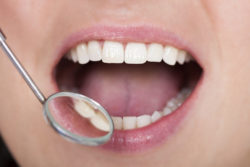
Our teeth: We should really appreciate them more than we do. We use them to chew the food that nourishes our bodies and helps us stay healthy and strong. We also show them off when we smile to make a good first impression when we meet someone new. Humans grow two sets of teeth in our lives: our “baby” teeth and our adult teeth.
Once your adult teeth finish growing in, usually by age twelve or thirteen, it’s absolutely necessary to take good care of them as you won’t be growing anymore replacements. The biggest threat to a lifetime of healthy, natural teeth are cavities.
What Is A Cavity?
Cavities form when spots of tooth decay have eroded holes (also known as cavities, hence the name) in our tooth enamel, allowing bacteria access to the sensitive nerves and soft tissues inside. These bacteria create infections inside your teeth which can spread down into your gums. The nerves being exposed can also lead to a sensitivity to temperature and touch, making proper chewing difficult. Painful chewing can limit dietary options, interfering with you getting all the nutrients you need. After the common cold, cavities are the most frequently diagnosed illness that people are diagnosed with.
But what causes cavities? What can we do to prevent them? And how do we fix them if we get them? Dr. J. Stephen Hoard in New Bern, NC has the answers.
How Do Cavities Form?
Bacteria, most of it relatively harmless, live in our mouths since it is warm and wet — their favorite environment. These bacteria feed off plaque, especially the plaque that remains in places that are hard for us to clean such as in between teeth and right at the gum line. When we eat foods that are rich in carbohydrates such as sugars (like in donuts and candy) or starches (like in potato chips), these bacteria break down these components using their digestive acids. These acids bind to the plaque, feeding on it and eventually on our enamel itself.
How Are Cavities Treated?
Once a cavity has formed, it is usually repaired by your dentist with a filling. In this process, your dentist reinforces the holes or weakened areas in tooth enamel with various substances. This stops the process of decay and blocks the bacteria, denying it access to the inside of your tooth. Fillings can be made of composite resin, amalgamated metals, gold, silver or glass ionomer. Dr. Hoard will consult with you to decide which route would work best for your teeth.
Preventing Cavities
As with many things, it’s easier to take care of something than to fix it once it breaks. It’s the same with your teeth and cavities. Brushing after meals or at least twice daily with a fluoride toothpaste is suggested by dentists to remove the plaque from your teeth. Dentists also recommend cutting down on carbohydrates and making sure you are properly hydrated. A dry mouth can hasten the acidic breakdown of your teeth.
Daily flossing helps to remove the plaque and prevent the formation of cavities in those hard to reach spaces between your teeth. The most important step is keeping regular check-ups and cleanings at your dentist’s office. For those patients in New Bern, NC area, call (252) 507-0373 or schedule an appointment online to consult with Dr. J Stephen Hoard. If you think you may be suffering from cavity or would just like a cleaning to prevent them, contact us today!
